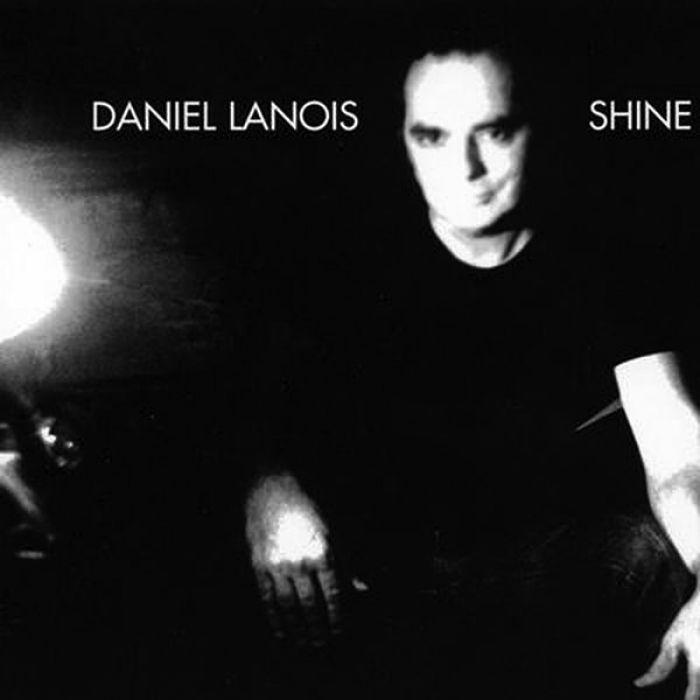Shine by Daniel Lanois (Review)

I’ve known of Daniel Lanois for many years, though mainly due to his work with other artists. In particular, I’m referring to his association with U2, to whom Lanois lent his production and musical talents on albums such as Achtung Baby, The Joshua Tree, and the underrated The Unforgettable Fire. However, aside from his work on the Sling Blade score, I’d never heard any of his solo output. But having listened to Shine, Lanois’ latest album since 1994’s Cool Water, it’s obvious that he’s capable of crafting music as equally impressive as that of his more famous cohorts.
Not surprisingly given the man’s resume, the album opens with two collaborations, one with Emmylou Harris (“I Love You”) and the other with Bono (“Falling At Your Feet”). While solid songs, and certainly those likely to garner the most fame due to the names involved, the album grows immediately stronger once Lanois strikes out on his own.
“As Tears Roll By” takes up an old-timey sound, as if Lanois got together with some buddies on the front porch to jam out an old spiritual. Over shuffling guitar, dreamy lap steel, and tasteful drum and piano flourishes, Lanois laments “I could be a patriot if I could see/But the TV talkin’ man make no sense to me/And I don’t know where our savior lives.” “Sometimes” continues along this troubled and introspective angle. Lanois confesses, “Sometimes I wanna take a pill and hide/Sometimes I wanna shut down and ride/And go where no man should go” over a lush atmospheric soundscape that drifts like a gentle breeze. On “San Juan,” Lanois softly plucks away on his guitar, creating gentle music that rolls out from the speakers as he pleads, “Make me see a whole new way/Make me see the new day/Make me be a whole new way.”
The title track, which contains some of the album’s most spiritual lyrics (“In the end, the thing that keeps me walking is your shine/Your shine in the morning/Your shine in the distance/Your shine inside the laughter and the ghosts”) finds Lanois layering dexterous guitars and lap steel over a shuffling rhythm. Wide-open spaces are hinted at, as if Lanois composed it while walking along the highway, the desert landscape passing by in the distance. Like many of the songs on this album, it evokes the feelings of a long journey, one fraught with growing trial and hardship, and yet whose destination will be worth it all.
Lanois reveals more struggle on “Fire,” pleading “Don’t take away my shine/My shine is all I have” one minute while confessing “It worries me sometimes that I want love/And live a life of sad” the next. While much of the album is characterized by doubt and anxiety, Lanois still expresses a hope that things will change for the better. In the reggae-tinged “Power of One,” Lanois sings “In the middle of the night it came to me/A bridge to your ecstasy/Images of a burned out hell/You comin’ in with your mission bell,” and then pleads with the listener (and perhaps himself, as well) “Don’t sit waiting for the thing to come/Get lit, feel the power of one.”
Such honesty is refreshing to hear these days. It often seems like artists today try to convey emotional depth through witty lyrics and sarcasm, or by piling on the angst and histrionics, or through some other device. In contrast, Lanois lays it all out on the table for us to see. It’s a gamble, and one that I find impossible not to appreciate. Bandoppler’s Treble once commented, in reference to Sufjan Stevens’ Michigan, that “it’s like the guy doesn’t realize that postmodernity happened, and he’s still caught up in being honest and creating real beauty.” That sentiment rings equally true for Lanois.
In addition to these beautiful and lyrical songs, Lanois throws in several instrumental pieces. Stripped of vocals, they truly display his ability for crafting lush, evocative music. On “Transmitter” and “JJ Leaves LA,” Lanois pulls one aching tone after another from his lap steel, allowing them drift over the listener like clouds in the desert sky. My favorite instrumental piece, however, takes on a moodier feel. Compared to many of the songs on Shine, “Matador” has an almost wintry tone (think Cocteau Twins’ Victorialand); here, Lanois sprinkles soft piano notes over layers of drifting tones, chimes, and other ghostly sounds that shift on the song’s periphery and toy with the listener’s hearing.
I saw this CD in the used bin and picked up on a total whim. Having heard Lanois’ work with other peoples’ music, I thought I knew something of what to expect. Needless to say, I got far, far more. Musically, it’s full of comforting and lovely sounds that wrap around the listener like a soft, warm blanket. However, the themes that Lanois weaves into his songs — themes of alienation, struggle, and confession, but also of a love and hope that picks him up, dusts him off, and allows him to lift his gaze and continue on the journey — are what give Shine its true beauty and character.
